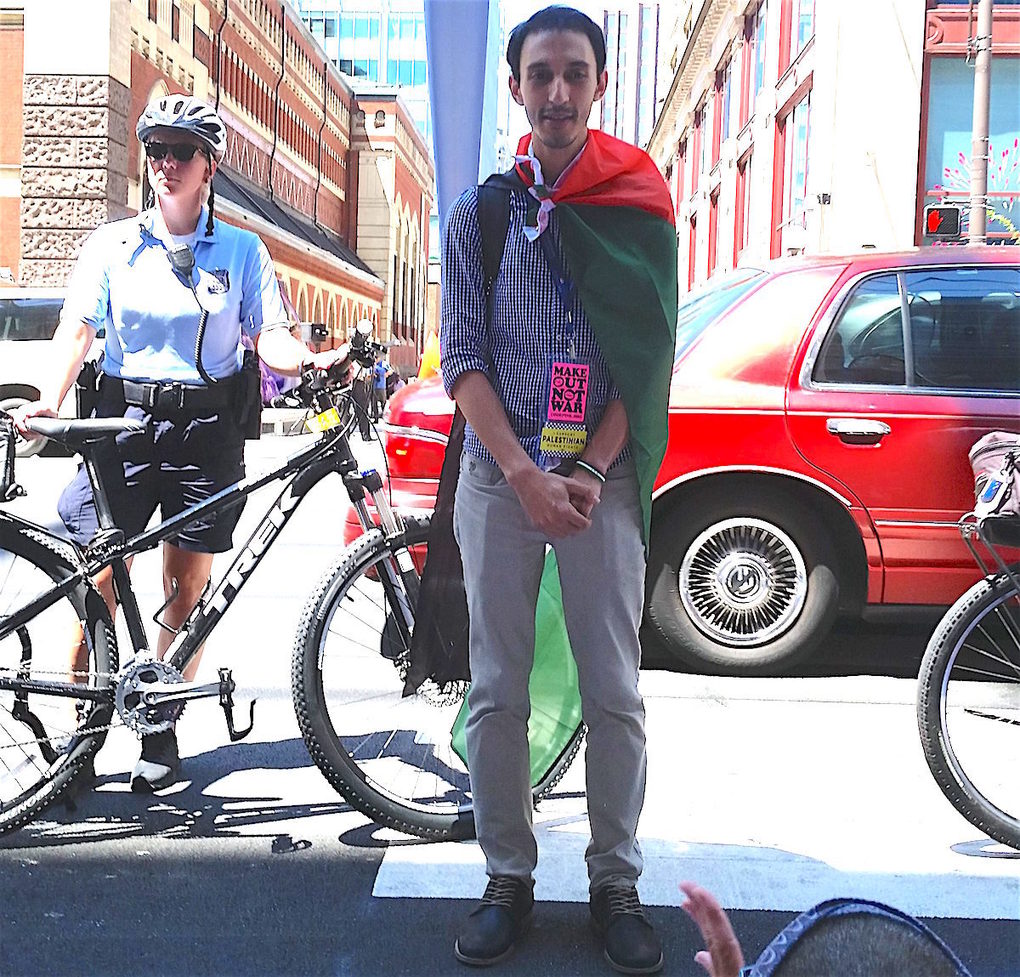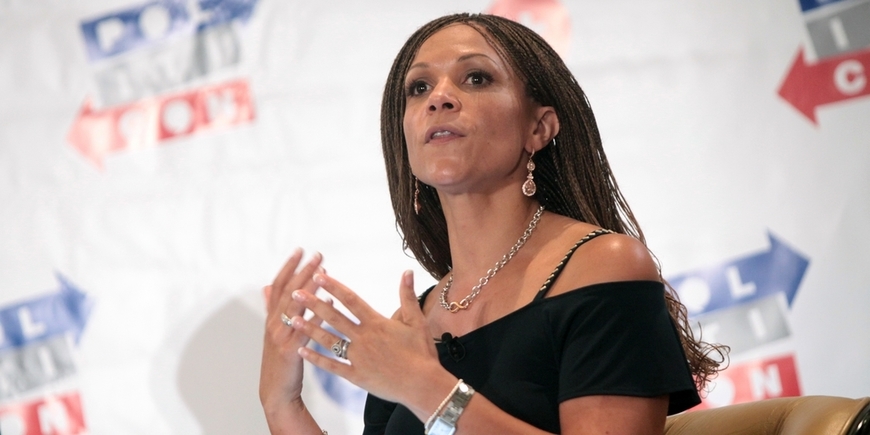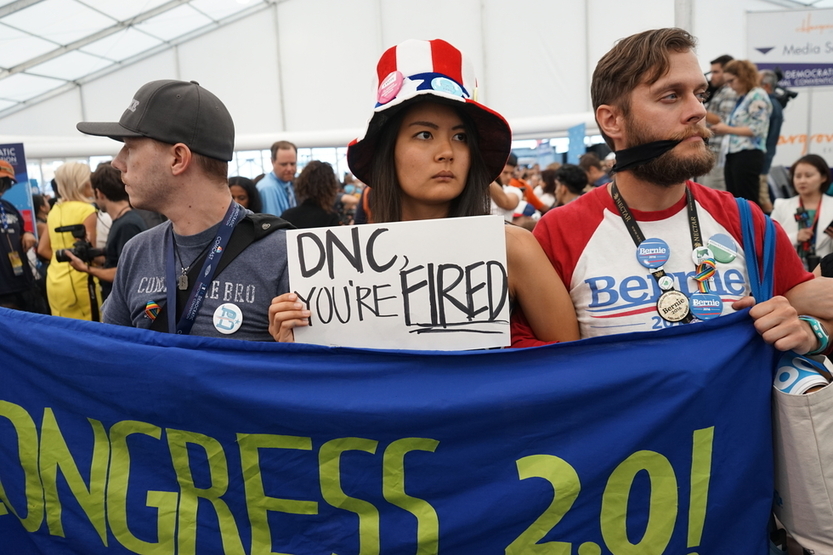
Aaron Sankin
The Daily Dot
The moment Donald Trump stepped onstage at Cleveland’s Quicken Loans Arena to officially accept the Republican Party’s presidential nomination, the reality of the situation finally hit Julia Shearson. She takes out her smartphone and snaps a picture of Trump’s face, framed by a wall of American flags, that emanates from the big-screen TV in a comfortable living room on a tree-lined street about a 30 minute drive from the arena.
Shearson had hardly been in denial about Trump having a legitimate shot at the presidency. With a light pink hijab shielding her head from the sweltering mid-July sun, Shearson had spent most of the week leading up to Trump’s speech standing next to a folding table in Cleveland’s Public Square, a few blocks from the Republican National Convention, handing out pamphlets and having conversations with anyone who would listen.
Shearson is the executive director of the Cleveland chapter of the Council on American Islamic Relations (CAIR). Founded in the mid-1990s, CAIR was created to counter the “stereotyping and defamation [of Muslim Americans that] was having a devastating effect on our children and paralyzing adults from taking their due roles in civic affairs.”
She says the daily experience of working for CAIR is “like sliding down a fire pole from one emergency to another.”
One day, she’s leading a diversity training for local police officers. The next, she’s doing legal advocacy for a woman whose manager won’t allow her to wear a headscarf to work. Since its inception, CAIR has always been busy. But, over the past year, with Trump making explicit the anti-Muslim rhetoric that has long bubbled just under the surface of mainstream American culture (and the spike in anti-Muslim hate crimes that has accompanied the candidate’s rise), their work has taken on a new urgency.
At a small house party in the Cleveland suburb of Westlake, I sip lemonade with Shearson and nearly a dozen of her fellow activists as they watch Trump officially become 270 electoral votes away from the Oval Office.
The 2016 presidential election has been particularly dark. Amid a constant drumbeat of terrorist attacks and vicious personal insults, the only enduring moment of levity involved ironic speculation that one of the candidates was a prolific serial killer. For American Muslims, many of whom feel under siege simply for existing, the darkness is magnified.
All of the activists at the party are from the Cleveland area. The GOP drew the nation’s eyes to their hometown, and they were determined to use it to their advantage. The area immediately surrounding Quicken Loans Arena, where the convention was being held, was cordoned off from anyone without the proper credentials and guarded by thousands of heavily armed police officers on strict orders to be as nice as possible to everyone not actively trying to start a riot—and, even then, mustering considerable restraint. As a result, most of the protests were centered around Public Square, a city block recently renovated into a mixture of grass and asphalt specially designed to make the control of large, potentially unruly, crowds more manageable.
On the Thursday Trump spoke, CAIR activists spent much of the day in the square, talking to people wearing bright red “Make America Great Again” baseball caps and handing out packs of Islamophobin, which was just chewing gum in satirical packaging.
CAIR’s goal was relatively straightforward: Simply by being there and talking to people who see them as a threat to society, maybe they could change some minds. That grind is why most of the activists who eventually headed to the party missed most of the evening’s speakers, like former NFL quarterback Fran Tarkenton and libertarian PayPal-founding Gawker nemesis Peter Thiel. The seemingly endless maze of road closures also didn’t make getting out of downtown any easier.
I catch a ride to the party with Ahlem Zaeed. She’s been working during the day as a nurse at a needle exchange doing HIV/AIDS prevention and then spending every night at the CAIR table in Public Square. In the car, she is still wired from spending a few hours amid the tension of the protests, answering pointed questions about Islam from protesters, the phalanx of heavily armored cops standing a few feet away serving as a constant reminder of how violence could break out at the any moment. Just under Zaaeed’s energy is a deep well of tiredness. Pulling double duty all week has clearly been exhausting. She talks about her day job and her night volunteer efforts with the same kind of weary pride. It’s hard work, but doing good is rarely easy.
Zaaeed, whose parents are both Palestinian, began volunteering with CAIR a couple years ago. She has four kids between the ages of nine and 15. As her brood got older, she found she had more free time to volunteer, and her involvement with CAIR gradually increased. She’s thinking about going back to school to get a master’s degree—possibly in public health.
Zaaeed says she decided to work the protests during the convention in order to serve as a first-hand counterweight to some of the pervasive stereotypes about Muslims floating through American culture. “A lot of people don’t know about who a Muslim is other than what comes through TV and the media,” she says.
As we arrive at the home of Ghiath Daghestani, a former CAIR board member, Trump’s daughter Ivanka has just started her speech introducing her father. Everyone sits down on overstuffed couches and watches, except for Zaaeed, who walks into the other room, lays down a small, yellow rug on the hardwood floor, and kneels toward Mecca.
Everyone at the party likes Ivanka. They call her smart, poised, and well-spoken. Her speech was clearly written to read as compassionate and welcoming, which is exactly how it’s received in the room. There is, however, one line from Ivanka’s speech that draws the room’s rancor. “If you’re an American, my father will fight for you,” Ivanka says.
“Unless you’re a Muslim.”
“Or black.”
“Or a woman.”
That sentiment of feeling excluded would come up again and again over the course of the night. The group is skeptical of Trump’s ability to make good on many of his campaign promises, which is hardly unique, but there is also a feeling that, as Muslims, they aren’t who Trump was talking to. The America he wants to make great again is a slice of the country that doesn’t involve them. Watching the convention is an exercise in eavesdropping on a conversation not intended to for their ears.
In that respect, Trump’s candidacy isn’t unique. Muslim Americans have historically been a natural fit for the Republican party, with its focus on conservative family values and a desire the represent the interests of small business owners who often feel over-regulated. In the 2000, George W. Bush won an overwhelming majority of the Muslim American vote. In the wake 9/11, wars in Iraq and Afghanistan, and the GOP’s general tendency toward demagoguery against Muslims, recent election cycles have seen the party capturing single-digit support among Muslims. In a deeply self-critical report released in the wake of the 2012 election, Republican leaders urged the party to reach out to various groups that were typically hostile to the GOP message, like Hispanics, Asians, and young people. Muslims—and Arab Americans in general, a majority of whom subscribe to religions other than Islam—didn’t warrant a mention.
As Trump speaks, the mood grows somber. People banter back and forth, alternately spouting facts that countered parts of Trump’s narrative and nodding in agreement with a, “Yes, that’s true” when he hit on indisputable points like China’s massive theft of American intellectual property or the crushing load of student debt suffocating America’s young adults.
Conversation gradually tapers off as they watch Trump’s speech, until one line hit like an electric shock: “We cannot stand to be politically correct anymore.”
“Uh oh,” says Shearson. “Here come the code words.”
“This is what scares me,” adds A’isha Samad, another CAIR activist.
During his speech, Trump makes a point of reaching out to demographics that typically haven’t been part of the GOP coalition. With a nod to the recent terrorist attack in an Orlando gay nightclub, Trump talks about the importance of protecting the LGBT community from violence and then commends the audience for applauding. The sentiment is laudable, even if the party’s platform has been widely criticized for its anti-LGBT bent, but Trump’s comments sting those in the room—like he is pitting one vulnerable community against another.
In terms of execution, Shearson notes, this is Trump’s best performance yet. But the rapturous cheers he receives when talking about terrorism and the threat posed by refugees fleeing the bloodshed of the Syrian civil war make her nervous. “I wish the camera would zoom in on the faces of the people in the audience,” she sighs, deflated. “Are these our neighbors thinking like this? Who are these people? This is really scary.”
“Trump talks about mass lawlessness, but he’s just scaring people,” says Samad. “All the people in the audience don’t experience mass lawlessness while they’re here in Cleveland, and they don’t experience mass lawlessness when they go home. He’s just trying to make them scared.”
By the end of the speech, Trump has accomplished what he had largely set out to do, whether he thinks of it that way or not—everyone in the room is afraid.
“I was concerned because I heard some code words that have been used in this country for a long time. He’s speaking to a place that we used to be. He’s hearkened to a hatred and a separation of people by using these coded phrases,” charges Samad. “He’s awakened that, and he knows what he’s doing. This is something they used to do all the time. They couldn’t say it outright, so they used these coded phrases—and everybody who knows, knows what it means. He’s doing it, and he’s doing it very well. Those are the people who he’s reaching.”
“Now, when they see me as a Muslim or … [someone else] as an immigrant, they feel freer to be nasty, to be hateful,” she continues. “When he’s talking about America in that way, I don’t think he’s including me or my immigrant brothers and sisters.”
“Muslims, Arabs, Hispanics, immigrants from anywhere in the world, I don’t think he actually sees them in America’s future,” says Nadia Zaiem. “Regardless of what he’s saying, if I’m not going to be seen as a big part of that future, how is that making America great? America, in my opinion, was built on the backs of immigrants. This country was created by immigrants coming from other places to have a better life. And to practice their religions and live their lives in peace and freedom. I think we’re backing away from that.”
Zaiem recalls a story a friend had told her about a recent interaction that was particularly troubling, that illustrates Trump’s America. This friend was standing in line to buy coffee in nearby Strongsville, and an older man kept saying that he wanted “American roasted coffee, not foreign roasted coffee,” and then cut in front of Zaiem’s friend in line. The friend, wearing a headscarf and just wanting to make it through her day, felt isolated and small, like she didn’t belong.
“This is what Trump is doing,” Zaiem says. “He’s convincing people that America is being overrun with foreigners, immigrants, and refugees.”
Zaiem’s father, Isam, a co-founder of CAIR’s Cleveland chapter, says the concept of division, of ‘us vs. them,’ was one he ran into repeatedly while manning the CAIR table in Public Square all week. “I found myself as if I were in a different world,” he says.
Isam recalled one conversation with a Trump supporter a few hours before Trump’s big speech. “The message that he kept coming back to, and he even used these words, ‘What’s in it for me [to let Muslims be part of America]?’” he said. “He kept asking me questions like, ‘If Muslim families … produce five or six or seven kids, in no time, we’re going to have a different America.’ And I said, ‘Yes, so what? What’s the difference?’ I don’t care what color you are. It’s not about you. It’s not about me. It’s about us as a community, as people. You protect my back, I protect yours. We are all in this together.’”
“I kept telling him that we are a nation of immigrants. In this country, except for American Indians, we are all immigrants that came at a different times. Some of us came before others, but we are all immigrants. We cannot just completely shut the door and not allow others to come in,” he continues. “But he kept coming back with all of these questions that really reflect, in a way, fear about becoming a minority in his own country. He wanted to keep it a white majority country. In his mind, he has a superiority, he had a privileged that you cannot take away from him. How you can address that? I really don’t know.”
That conversation, at its core, stayed respectful because, for all of their differences, both sides were really just trying to understand each other. It was tense, to be sure, but democracy is controlled tension.
At the end of the night, Samad drives me back to the Airbnb where I am staying. As we speed down the highway, passing packs of police SUVs parked on the shoulder and an electronic billboard urging people to report any suspicious activity they notice to the FBI tip line (“If you see something, say something”), she tells me about how she got her start in activism.
After missing a court date due to a mix-up from her lawyer, Samad spent a night jail. While locked up overnight, she was forced to take off her headscarf. Samad sued the city, claiming religious discrimination. CAIR was one of the groups that helped her with the suit, and she decided to start volunteering.
I ask if she had seen the small child playing in the fountain that afternoon across the plaza from where CAIR had set up their table. She hadn’t; her view had been blocked by a line of cops in riot gear and throngs of angry protesters. I had taken a video and, when she pulls in from of the house where I was staying, I play for it her on my phone.
“That’s what it like to be free. That’s what it’s like to be really free and really just not care what people think,” she sighs. “I’m just scared that things aren’t going to get better, that they’re just going to get worse.”
“I guess all you can do is cross your fingers,” I say with a halfhearted shrug as I step out of the car.
Source: www.dailydot.com










